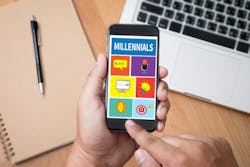Millennials' impact on dental practices: How to attract them with organic marketing
By Amber Auger, RDH, MPH
Those who were born from 1977-2000 are considered millennials. Often misunderstood, studies show this generation to be optimistic, generous, team-oriented, and highly adaptable.(1) Accounting for 75.4 million people in America, outnumbering baby boomers, it is essential to understand how to properly manage millennial team members, as well as effectively engage millennial patients.
Millennials connect through storytelling. During the initial appointment with a millennial patient, allow them to understand why you are passionate about the dental field.(1) This will create a strong foundation/patient connection to the office, as this generation is known for having a high emotional IQ. Utilizing technology such as intraoral cameras will create urgency to complete the treatment and demonstrate that the practice is up-to-date.
Millennials have been surrounded by paid advertisements their entire lives, therefore marketing with a stock image will not engage them. Millennials work best with organic marketing, such as a personal recommendation from friends, family, or social proof of a personal connection with the dental team.(2) Desiring to have real and unfiltered opinions of the office, Yelp and Facebook reviews have become a popular way to attract, or deter, potential new patients. Managing social media accounts of the office with organic posts with real patients will influence more patients into the practice.
Millennials are motivated by “giving back.” Millennials often choose to align themselves with brands that give back to the community, therefore highlighting contributions locally will increase the millennial patient population. Millennial team members have also been shown to stay longer in a practice that is involved in serving the community. Examples of giving back range from providing free dental services to volunteering at a local food bank.
Millennials embrace communication through technology. Patient communication systems that allow for texts and emails for appointment reminders is highly valuable to a millennial patient. Automated reminder systems suggest that the office is current on technology, and therefore their dentistry is as well. Additionally, 97% of the patients surveyed reported they prefer to confirm appointments through a text message rather than a phone call.(3) These automated systems range from simple text reminders to offering direct patient communication through messaging systems.
To have a continually thriving office, changing dated protocols and systems is needed. Consistent team effort and accountability is needed to transform the state of an office. Offices that fail to mold into the needs of the millennial patients will be at a disadvantage. Investing in proper tools to engage millennials will allow your office to thrive.
References
- McGee, J. Teaching Millennials. 2015. Available at: http://www.ame.pitt.edu/documents/McGee_Millennials.pdf. Accessed October 30, 2017.
- Muhammad, A. How to Sell Millennials. Available at: https://www.entrepreneur.com/article/284249 Accessed October 30, 2017.
- Friedman, D., Williams T. Study reveals how automated patient appointment reminders affect dental practice no-show rates and production. 2016. Available at: http://www.dental-tribune.com/articles/specialities/practice_management/13603_study_reveals_how_automated_patient_appointment_reminders_affect_dental_practice_no-show_rates_and_production.html. Accessed October 30, 2017.


